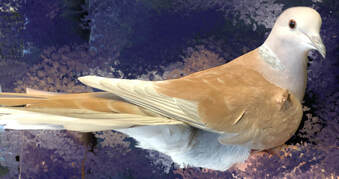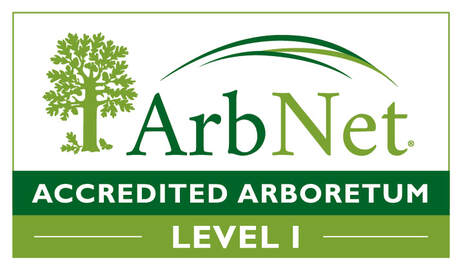Ring-Necked Dove (Streptopelia capicola capicola)

Common Name: Ring-necked Dove
Scientific Name: Streptopelia capicola capicola
Physical Description: The Ring-Necked Dove is a slender bird that averages 10 inches in length and weight 3 to 6 ounces. They have a 14-inch wingspan. Individual plumage variation is high, with some light and others almost sooty. The majority are a pale, sandy brown with a narrow, black half-collar on the back of the neck. They have a white tipped, somewhat long, rounded tail to aid in balance. Their eyes are almost black and the area around their feet is a reddish hue. Juveniles have duller plumage and lack the semi-collar of an adult. Their soft, dense feathers detach easily as a defense adaptation.
The flight of the Ring-Necked Dove is characterized by noisy wing beats when flying upwards and quiet downward gliding with outstretched tail and wings. Ring-Necked Doves can change direction quickly in flight. They are extremely swift and can fly at 45 to 50 mph.
In addition to eating, they use their small, skinny, pointed, black beaks to drink, inflict injury, to produce song, preen their feathers, and build their nest.
Habitat: They can be found in urban and suburban areas, although they are not often found in heavily forested or cold environments.
Range: They are originally from West Africa, however they have been domesticated and can be found worldwide.
Diet: Ring-necked Doves eat seeds, berries, insects and invertebrates.
Lifespan: They live 12 years on average in human care.
Social Structure: Although they usually live alone or in pairs, they form quite large flocks around food sources or drinking areas.
Ring-Necked Doves breed year-round. They are monogamous and pairs mate for life. Nests are built 10 or more feet above the ground. The male dove brings the female twigs, grasses, roots and other nesting materials. The female builds a simple platform nest. A pair often uses the same nest for multiple broods during the year and may renovate old nests.
The female will lay two or three white or cream-colored eggs that are incubated for 15 days by both parents. Newly hatched birds are helpless, but grow quickly, reaching their adult size in around six weeks. Both parents feed the young on “crop milk,” which is the sloughed lining of their upper digestive pouch regurgitated directly into the squab’s beak. As the young mature, increasingly more seed and grit are mixed with the milk solution until they are weaned and they learn to peck and to eat seeds on their own.
The young leave the nest after 14 to 18 days.
Status: Least Concern1
Other: Originally descended from the African Collared Dove, the Ring-Necked Dove has been domesticated for over 2000 years. Due to their domestication, these birds are quite fearless of humans. However, they do maintain an instinctive freeze response when startled by a shadow overhead, because, in the wild, this may indicate a bird of prey.
Ring-Necked Doves have extremely refined navigational abilities. The magnetic tissues within their heads help them to detect the Earth's magnetic field, which helps them to determine flight path direction. Because of their navigational abilities, doves and pigeons were often used as messengers throughout history, especially in times of war.
1 https://www.iucnredlist.org/species/22690488/132061633
Scientific Name: Streptopelia capicola capicola
Physical Description: The Ring-Necked Dove is a slender bird that averages 10 inches in length and weight 3 to 6 ounces. They have a 14-inch wingspan. Individual plumage variation is high, with some light and others almost sooty. The majority are a pale, sandy brown with a narrow, black half-collar on the back of the neck. They have a white tipped, somewhat long, rounded tail to aid in balance. Their eyes are almost black and the area around their feet is a reddish hue. Juveniles have duller plumage and lack the semi-collar of an adult. Their soft, dense feathers detach easily as a defense adaptation.
The flight of the Ring-Necked Dove is characterized by noisy wing beats when flying upwards and quiet downward gliding with outstretched tail and wings. Ring-Necked Doves can change direction quickly in flight. They are extremely swift and can fly at 45 to 50 mph.
In addition to eating, they use their small, skinny, pointed, black beaks to drink, inflict injury, to produce song, preen their feathers, and build their nest.
Habitat: They can be found in urban and suburban areas, although they are not often found in heavily forested or cold environments.
Range: They are originally from West Africa, however they have been domesticated and can be found worldwide.
Diet: Ring-necked Doves eat seeds, berries, insects and invertebrates.
Lifespan: They live 12 years on average in human care.
Social Structure: Although they usually live alone or in pairs, they form quite large flocks around food sources or drinking areas.
Ring-Necked Doves breed year-round. They are monogamous and pairs mate for life. Nests are built 10 or more feet above the ground. The male dove brings the female twigs, grasses, roots and other nesting materials. The female builds a simple platform nest. A pair often uses the same nest for multiple broods during the year and may renovate old nests.
The female will lay two or three white or cream-colored eggs that are incubated for 15 days by both parents. Newly hatched birds are helpless, but grow quickly, reaching their adult size in around six weeks. Both parents feed the young on “crop milk,” which is the sloughed lining of their upper digestive pouch regurgitated directly into the squab’s beak. As the young mature, increasingly more seed and grit are mixed with the milk solution until they are weaned and they learn to peck and to eat seeds on their own.
The young leave the nest after 14 to 18 days.
Status: Least Concern1
Other: Originally descended from the African Collared Dove, the Ring-Necked Dove has been domesticated for over 2000 years. Due to their domestication, these birds are quite fearless of humans. However, they do maintain an instinctive freeze response when startled by a shadow overhead, because, in the wild, this may indicate a bird of prey.
Ring-Necked Doves have extremely refined navigational abilities. The magnetic tissues within their heads help them to detect the Earth's magnetic field, which helps them to determine flight path direction. Because of their navigational abilities, doves and pigeons were often used as messengers throughout history, especially in times of war.
1 https://www.iucnredlist.org/species/22690488/132061633






